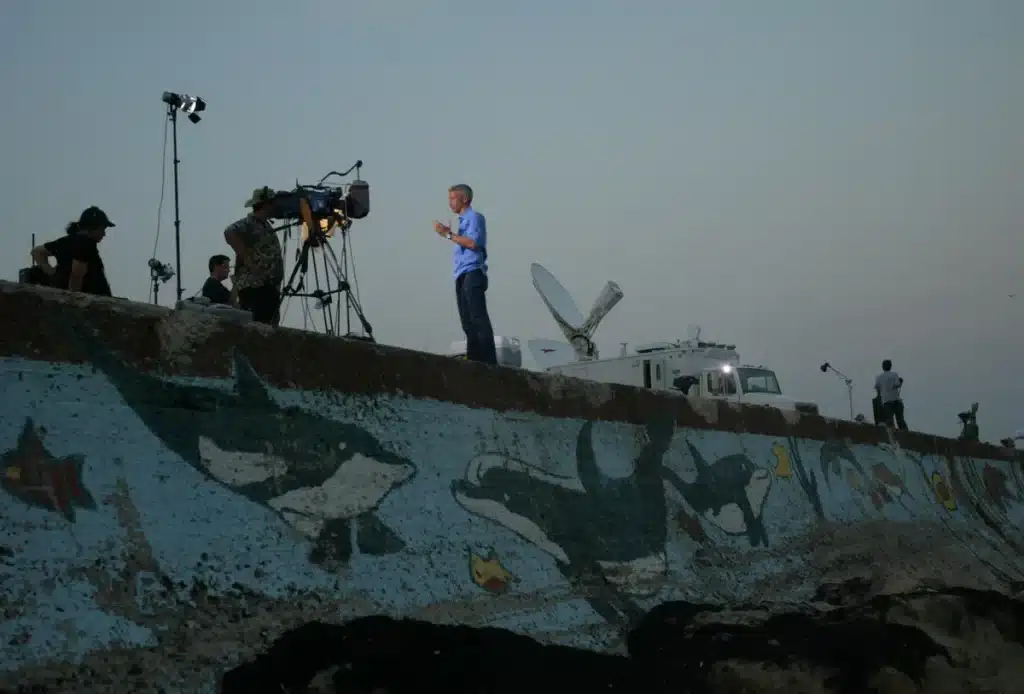On the evening of Wednesday, October 9, 2024, Anderson Cooper was reporting live as Hurricane Milton, a powerful category-3 storm, made landfall on Florida’s coastline. While covering the devastation in Bradenton, a city near Tampa, Cooper was struck by flying debris, a moment that quickly led fans to voice their concerns for his safety.
As the storm raged on, Cooper described the scene, saying, “At the water now, and it’s really starting to pour over,” as massive waves and fierce winds battered the area. Suddenly, debris hit him in the face, prompting him to react, “Woah, OK, that wasn’t good,” before noting that he would head indoors soon.

Viewers watching the live report were quick to express their worries on social media. Some urged CNN to pull their reporters out of harm’s way, with one concerned fan saying, “I am very concerned for his safety!” Others reminded Cooper of his responsibilities, emphasizing that he had children to think of.
Cooper wasn’t the only reporter braving the extreme conditions of Hurricane Milton. Bill Weir, reporting from St. Petersburg, faced heavy rain and gusting winds that were so strong they knocked off his hat. Similarly, Jim Cantore of The Weather Channel was struck by a flying tree branch while reporting in the middle of a street. He was almost blown off his feet by the intense winds, managing to brace himself against a post before stepping aside to let viewers observe the unfolding storm.


Amidst the chaos, residents of St. Petersburg, like Makenna Caskey and her aunt, narrowly escaped a disaster when a crane collapsed on a building across from their apartment. Caskey expressed her relief that they had been spared, noting how close the crane had come to causing a different outcome.
Unfortunately, the storm also led to tragic events. A tornado ripped through a mobile home retirement community in St. Lucie County, resulting in fatalities. While the exact number of lives lost has not yet been confirmed, Sheriff Keith Pearson indicated there were multiple casualties. Search and rescue teams are continuing their efforts to locate those trapped in the wreckage, as hundreds of homes have been destroyed across the region.



Anderson Cooper’s dedication to reporting from the front lines, even in the most dangerous situations, reflects his broader commitment to capturing the human experience in times of crisis. He has long emphasized the importance of not becoming desensitized to the destruction and loss that often surround journalists in these situations. His experiences, such as his time reporting from Rwanda, have taught him to remain emotionally connected to the stories he covers, ensuring that he sees people as individuals rather than just part of the broader tragedy.


Cooper’s approach to journalism has had a lasting impact on many, including young aspiring reporters. His candidness and compassion have inspired students like Neda Langroodi, who admired his dedication to honoring the names of those who have passed. For others, such as nursing student Sasha Meraj, Cooper’s reflections during events like “An Evening with Anderson Cooper” serve as reminders of the importance of caring for people around the world.
As a seasoned journalist, Cooper encourages future reporters to engage deeply with the stories they cover and to approach every assignment with curiosity and empathy. He urges students to embrace continuous learning and to take on challenges with enthusiasm. For Cooper, reporting never feels like work; it’s a passion that allows him to connect with people and share their stories with the world.

